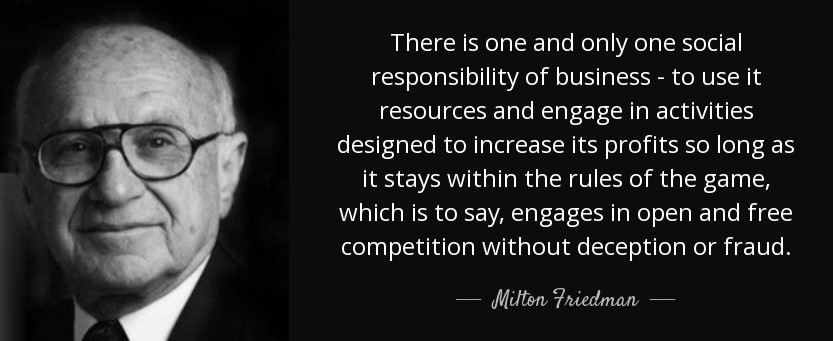Germaine: When people like Milton here get rid of regulations,
there are no pro-public interest rules of the game,
only legalized greed, opacity, deception and fraud are left
With this radicalized Republican court, Loper Bright constitutes a massive shift in power from the federal government and the public interest (consumer protections, worker protections, financial regulations, environmental regulations, health care regulations, marketing regulations, etc.) to radical right authoritarian elites and businesses. This USSC decision seriously empowers the rise of kleptocratic authoritarianism.
Experts are starting to write about the consequences of Loper Bright. The WaPo writes (not paywalled):
Now legal scholars are unsure how much of the U.S.’s administrative framework — decisions made by legions of experts and bureaucrats responsible for the daily operations of the federal government — could fall in the months and years to come.
“It means chaos,” said Dorothy A. Brown, a law professor at Georgetown University. “This is the Supreme Court cutting back on agency power knowing that Congress can never pass a law that will answer all questions. But it limits what government can do to protect people, protect consumers and impose costs on big corporations.”
Items the radical right authoritarian kleptocrats probably intend to target include student loan forgiveness regulations, regulations that protect transgender youth, and worker rights regulations.
Targeted workers’ rights will include nullifying expanded overtime pay eligibility, requirements for employers to accommodate pregnancy, guidelines on workplace harassment and standards holding franchised brands responsible for labor law violations.Also likely in the kleptocrats’ crosshairs are (1) federal government help for electric vehicles (the oil companies hate electric cars), (2) a federal crackdown on emissions from gasoline-powered cars and trucks (the oil and car companies hate emissions regulations and gas mileage targets), (3) corporate climate disclosures (most corporations and businesses want to freely pollute in as much secrecy as their pollution will allow, i.e., usually a hell of a lot of polluting), and (4) a new regulation for diagnostic tests that some hospitals develop in-house but are not covered by existing medical laws and regulations (health care providers and insurers hate transparency, regulations and accountability for their disasters and cruel policies).
Regarding the quoted comment about congress not being able to pass laws that answer all questions, these comments in 1949 by former US Attorney General Edward Levy are spot on relevant (my book review is here):
“This is an attempt to describe generally the process of legal reasoning in the field of case law, and in the interpretation of statutes and of the Constitution. It is important that the mechanism of legal reasoning should not be concealed by its pretense. The pretense is that the law is a system of known rules applied by a judge; the pretense has long been under attack. In an important sense legal rules are never clear, and, if a rule had to be clear before it could be imposed, society would be impossible. The mechanism accepts the differences of view and ambiguities of words. It provides for the participation of the community in resolving the ambiguity by providing a forum for the discussion of policy in the gap of ambiguity. On serious controversial questions it makes it possible to take the first step in the direction of what otherwise would be forbidden ends. The mechanism is indispensable to peace in a community.”

No comments:
Post a Comment